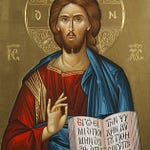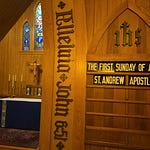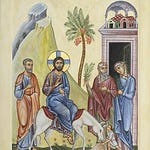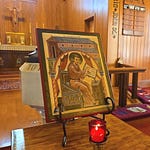I want to reflect today on the meaning of “wretchedness” which is part of the Collect for all of Lent. Before I do, let us hear again that “the Spirit” drove Jesus out into the wilderness. And He was n the wilderness forty days, tempted by Satan, and He was with the wild beasts; and the angels ministered to Him.” Two common misconceptions about this pivotal episode in the life of Our Lord Jesus Christ, the Son of God, must be cleared away. We are at the beginning of Lent, and the Church’s season of prayer during Lent is directly modeled on the 40 days of Jesus in the wilderness. This is a powerful moment, a truly pregnant paradigm—Our Lord in the wilderness fighting Satan, fighting his wild beasts (which represent the devil’s army), surrounded by angels—let us see how our Lenten prayer ought be guided and led.
The first misconception is that “the Spirit” and Jesus are not one. That is wrong. Jesus is being unwilling to enter into the wilderness, needing something to prod Him like a cattle rancher drives his cows into a field for grazing. There is no separation between the Spirit and Jesus. The two, along with the Father, are one God. Going to the wilderness was a positive choice by Jesus to enter into battle, and specifically, to enter into a battle that is spiritual. The Church in the season of Lent invites her members to do the exact same. We are invited to enter into a spiritual battle, to wage unseen warfare, which is the battle waged by spiritual forces for control of our heart. For as S. Paul teaches us in his epistle to the Ephesians, we are not contending against flesh and blood, but against principalities, against the powers, against the world rulers ( of this present darkness, against the spiritual host of wickedness in the heavenly places. It is unseen warfare waged—as I often say, all God wants is the human heart.
The second misconception is that Jesus is some sense needed to enter into the wilderness for His own pureness of heart—that He Himself was not clean and therefore needed spiritual purging. Let this be known clearly: Jesus needed no spiritual purging. As Saint Paul wrote to the Hebrews, Jesus was “in all points tempted like as we are, yet without sin.” Entering into the wilderness was not for Jesus as if going to college to find Himself. Again, Jesus Christ is the Son of God, and He always was so: for through Him all things were made, and without Him nothing was made. No, His choice to enter into spiritual combat with Satan was not for His benefit, but entirely for ours. Everything Jesus did was not for Him, but for His servants, was for those who would deny themselves, take up the Cross, and follow Him. Jesus in this episode in the wilderness offers preeminent spiritual direction through demonstration—a deeper relationship with Him is gained by imitating His choice to confront the demons, to confront manifold temptations. It is by doing so, Jesus teaches, that our conscience can gain clarity, that our knowledge of Christ’s presence in our hearts may be stronger, that our hearts thereby might be illumined, and our lives more filled by love, peace, and living faith in stronger relationship with Christ.
The prayer of all Lent is the Collect for Ash Wednesday; it is traditionally said every day in Lent, and traditionally it is the second Collect at Mass. It articulates important doctrine for our devotion in Lent. God, in the prayer, is acknowledged as He Who hates nothing that He has made, and does forgive the sins of all those who are penitent. Our loving God seeks to offer His forgiveness if we move towards Him. We ask, in the prayer, for God to create and make in us new and contrite hearts, that we, worthily lamenting our sins and acknowledging our wretchedness, may obtain of Him, the God of all mercy, perfect remission and forgiveness. In other words, there is not just value in becoming aware of and lamenting our sins and acknowledging our wretchedness transforms us.
And now, “wretchedness.” It is a word that is somewhat out of fashion. Some of us might have no problem with that label, while others might be repelled by it. The more traditional term for wretchedness is “concupiscence.” And what concupiscence means is excessive and inordinate desire for personal satisfaction, and desire for the things of the world, instead of the things of the spirit. We see concupiscence is the story of Jonah, when, despite being saved by God from the belly of the fish, and despite witnessing God’s message for Ninevah so readily and successfully received, Jonah is angry and show strange, and inordinate, desire for the plant God gave him for shade. This is misplaced desire: seeing the plant as the source of shelter and protection rather than God, on top of the fact that Jonah seems not to want to please God, another example of concupiscence. We see this also in the Parable of the Pharisee and the Tax Collector. The Pharisee in the parable demonstrates concupiscence in the swagger he seems to have as he desires to be seen as special in the eyes of God, and superior to others, especially the tax collector. There is a certain “pride of life” shown by the Pharisee which is a mark of concupiscence, a mark of his “wretchedness.”
All in all, concupiscence (or “wretchedness”) names our inclination to sin, and it is part of the human condition, something we all suffer from and are tempted to give into. Concupiscence shows up in blunt and obvious ways, as well as subtle and hidden ways. Our responsibility in Lent is to acknowledge it our concupiscence, our wretchedness, and do so before God—that we may obtain of Him, the God of all mercy, perfection remission and forgiveness, through Jesus Christ our Lord. Amen.










